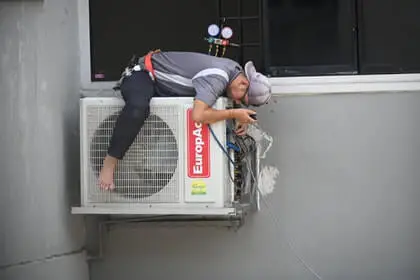A common issue with AC systems is that they produce odors from time to time, which may be a result of a buildup of bacteria or mold on coils or ducts. The most commonly reported odor is a vinegar-like smell that isn’t dangerous but can still cause discomfort if you’re sensitive to smells.
If your AC smells like vinegar, it is usually due to the AC’s evaporator coil becoming dirty and releasing this smell into the air. The coils are responsible for removing moisture from the cool air that runs through your vents, so if they become dirty mold and bacteria will grow on them and cause a vinegar-like smell.
Bacteria thrive in moist environments and are able to survive when water condenses into droplets on the evaporator coils or other surfaces where it then sits indefinitely.
This bacteria causes an acrid odor that smells similar to vinegar because these types of bacteria produce acetaldehyde as a by-product.
How to get the vinegar smell out an AC?
Using a commercial cleaner – To remove the smell, you will need to clean the coils of your unit with a commercially available coil cleaner or household vinegar solution.
Make sure to turn off the AC while cleaning it so you don’t get shocked or damage the coils. Cleaning them should completely remove all odors coming from your AC.
If the smell remains or you want to prevent this type of issue from happening again, you should consider changing your AC’s air filter. This will remove any bacteria and mold within your AC before they can begin to grow again.
Using a homemade product – To try getting rid of the vinegar smell using a homemade solution, you can use a 50-50 mixture of water and white vinegar (regular distilled) inside your AC unit. You then need to open up your AC and wipe down the coils and vents with your solution.

This should remove any bacteria that may be present on those surfaces.
If you choose this method, make sure you thoroughly rinse off the solution after use to avoid any damage to your AC. Always turn off or unplug your unit before cleaning it as well.
The most commonly used solution is to mix 2 cups of white vinegar with 1 gallon of water and then use this mixture to wipe down the coils. Be sure that the coil is completely dry before you turn your AC back on after doing this or else it will short circuit.
Keeping your unit’s vents clean – Another simple way to prevent an AC from smelling like vinegar is by removing any debris from the unit’s grills and evaporator coils each month.
You can do this simply by using a handheld vacuum to remove any leaves, dirt, or other debris that may be clogging up your unit.
Your AC system will keep working properly and produce cool air if you regularly clean it, so make sure you take the time to maintain it instead of waiting for an issue like this to arise.
How to stop air conditioner from smelling like vinegar?
If you want to prevent the smell from happening again, make sure to replace your air filter with a new one and clean off coils before replacing it back.
You can also stop the vinegar smell by using cleaning products to clean your air conditioner. The cleaning products will kill the mold and bacteria growing in your AC system and kill the smell.
Before you do any type of cleaning, make sure to unplug your AC unit so you don’t get shocked or damage the coils.

- Turn off the AC before cleaning it so you don’t accidentally damage the unit when turning it back on.
- If this doesn’t work, check if there is a blockage in your air conditioner vents or in the drain hose which is located at the back of your AC.
- Line up a straightened out paperclip with the hole, thread it through and see if anything comes out.
- If nothing comes out, you should check if the drain has any blockages or if your AC isn’t draining properly.
If this is the case, you will have to contact a professional to take a look at it for you. They will check for any other damage in your AC unit and then clean off the coils while.
Once the problem is fixed, they may recommend having your AC cleaned at least twice a year by a professional air conditioning company instead of doing it yourself.
If you do not want to spend money on expensive services, make sure you use the homemade cleaning solution and completely wipe it dry after using it.
If these methods still do not work, you may want to consider replacing your air conditioner unit.
How long does it take for vinegar to dry?
The time it takes for any type of liquid to evaporate from its surface varies depending on the temperature and humidity levels.
The time it takes vinegar to dry is usually up to 30 minutes. After the set time has passed, the vinegar can be rinsed and wiped dry. If you don’t want to smell like vinegar yourself, make sure to wear rubber gloves while using them.
If you use vinegar in your AC, Be sure to thoroughly rinse off all of the vinegar once you are done using it. If you forget this step, it could damage your AC unit when you turn it back on.
Does vinegar smell go away?
The smell of vinegar may be very strong when you first open the bottle. However, there are several ways to get rid of that pungent odor if it lingers after cleaning your AC with this product.
The acetic acid in vinegar can react with certain chemicals in the air and form compounds that don’t smell like vinegar anymore. Over time, the smell will completely disappear if left alone.
You can speed up the process by leaving a box of baking soda near your AC unit so it absorbs the vinegar smell.

You should also open your windows to let fresh air in and circulate using fans to help clear out any odors caused by vinegar. Even if these methods don’t work, you will eventually notice that the smell of vinegar will eventually fade away on its own.
If you notice the vinegar smell inside your house disappearing after an hour, you can be certain that it’s gone once and for all.
Additional tips on removing vinegar smell
Some additional tips on how to get rid of the vinegar smell faster.
Open a window while you work – You can speed up the dissipation of odor by opening a window or turning on multiple fans in the room. This will help circulate the air and make sure that condensation doesn’t develop in your home.
Reduce the vinegar ratio – If you are concerned about the smell of vinegar lingering, you can cut the vinegar with water to reduce the concentration of acetic acid. This will make it harder for you to smell its strong odor while still getting rid of any germs on your AC.
Get a fan – Another way to help get rid of any lingering odors caused by vinegar is by having one or more fans in the room.
Wear rubber gloves – When using vinegar, you should wear rubber gloves to protect your skin from the caustic substance in vinegar. You can also apply some moisturizer on top of your hand after working with vinegar.
Flush your AC – When you are done cleaning your unit with vinegar, make sure to flush out all of the residues from the product before turning it back on. Otherwise, this may damage the components inside and cause more problems for you.
Use a vaporizer – After waiting several hours or overnight, if that doesn’t work then try using a vaporizer. Put some water in it with a few drops of essential oil or vanilla extract and let that run overnight. Or you can use the vaporizer during the day when you are home to help mask any vinegar smell.
Use carbon charcoal instead of baking soda – This product is known for absorbing scents, so you can try using it if you don’t have baking soda around.
Do not use vinegar on the outside of your AC unit – It is important to note that you should never use vinegar on the outside of your AC unit because it may damage the finish. This is especially true if you live in a hot or humid climate where condensation can build up quickly on most surfaces.
How often to use vinegar in ac?
If you want to prevent the AC from smelling like vinegar, make sure you change the air filter at least every 6 months.
You can also place bowls filled with white vinegar around your AC unit so it absorbs any strong odors caused by mold and bacteria.
If your AC still smells like vinegar after you’ve cleaned it with the product, try using activated charcoal to absorb leftover odors. This is commonly used in air purifiers and can be found at any home improvement store.
Additionally, if the smell comes from a different source inside your house, make sure not to use vinegar to clean up the mess outside your home. This will only cause more problems by making your AC smell like vinegar.




